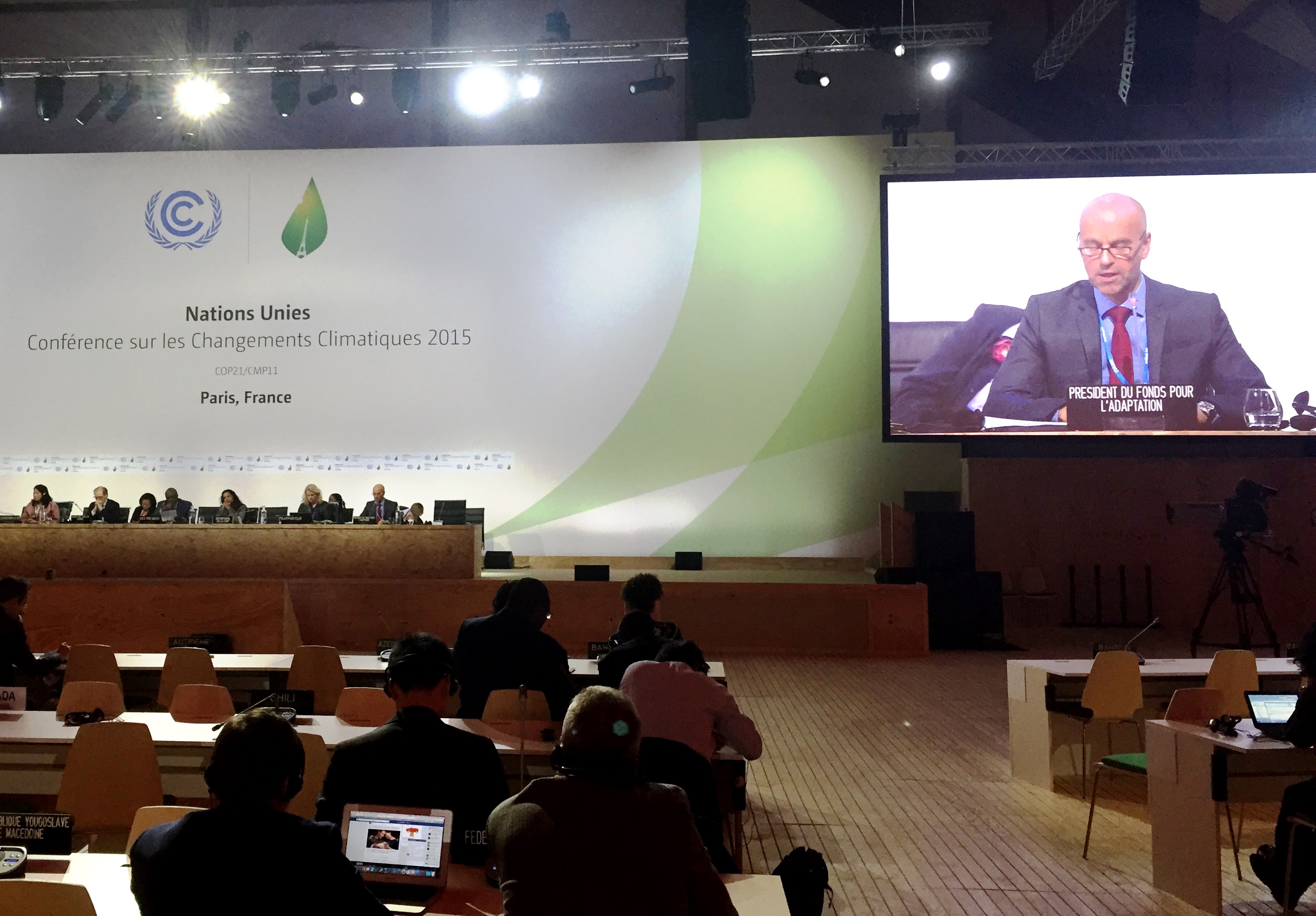AFB Chair Reports on Fund’s Demand and Effectiveness at Paris Climate Conference
Paris, France (December 2, 2015) – In a plenary level speech at the Paris Climate Change Conference (COP21/CMP11), Adaptation Fund Board Chairman Hans Olav Ibrekk reported on the “high demand and effectiveness” of the Fund to the meeting’s country members as it seeks “more sustainable” funding streams over the long term.
Aimed at assisting highly vulnerable developing countries adapt and build resilience to climate change, the Fund has allocated US$331 million to 51 concrete adaptation projects in 45 countries, benefiting over 3.5 million people. The Fund finances programs across a range of sectors, including coastal zone management, sustainable agriculture, water security and disaster risk reduction.
“The Adaptation Fund is an innovative, flexible and unique climate fund, which allows resources to reach beneficiaries in a swift and transparent manner,” Ibrekk said. “It is the only climate adaptation fund that includes the most vulnerable communities as a strategic priority and that is currently implementing concrete direct access projects on the ground.”
Ibrekk cited a recent independent evaluation that confirmed the Fund’s value as both a learning institution and being efficient, effective and relevant in its adaptation efforts. Demand for projects is growing rapidly, with a record 40 individual project ideas submitted during this reporting period.
He praised the Fund’s pioneering ‘Direct Access’ program, which allows countries to access finance and develop projects directly through accredited National Implementing Entities (NIEs) while strengthening local expertise. The evaluation concluded that Direct Access represents a major advance in climate finance and is making essential contributions to countries’ adaptation priorities.
Direct Access has also been very well received by the NIEs themselves. Mandy Barnett, Director of South Africa’s NIE, the South African National Biodiversity Institute, praised the program for building institutional capacity, connecting diverse stakeholders and doing things differently to address climate change. “I’m a great proponent of Direct Access,” she said. “The projects are localized. They are fully endorsed by the local authorities and local communities as well own the projects. It’s about making a difference on the ground. They are replicable, scalable and it’s also about catalyzing much bigger things.”
The numbers of NIEs and NIE projects are also rising. “The Fund has never been more in demand,” Ibrekk said. “Direct Access projects have almost tripled. The Board has also accredited two more NIEs, and approved a streamlined procedure for accreditation of smaller entities. Furthermore, there is extremely high demand for the Fund’s successful Climate Finance Readiness Program.”
The Fund’s Readiness Program has conducted nine seminars directly in developing countries and Washington, D.C. and just expanded last month to include global webinars to help guide NIEs and prospective NIEs through the accreditation and project development processes. There has been increased related interest for regional south to south cooperation and technical assistance in implementing environmental and social standards, as well.
The Fund additionally strives to build relationships and connections with other climate funds such as the Green Climate Fund in areas where complementary efforts make sense.
However, despite the proven effectiveness and growing, robust pipeline of the Adaption Fund, Ibrekk said it needs further commitments of at least US$78million this year to ensure its sustainability so that it can continue its important and urgent work.
He thanked the government of Sweden for pledging US$17 million on Monday during the opening of COP21 and Luxembourg for a contribution announced after COP20 last year. “We count on the support of all the Parties to allow the Fund to continue providing support to the most vulnerable communities around the world,” Ibrekk advised.
ABOUT COP 21
The 21st session of the Conference of the Parties (COP) to the United Nations Framework Convention on Climate Change (UNFCCC) is taking place from November 30 to December 11, 2015, in Paris, France. With 196 member nations, the UNFCCC seeks a binding, universal climate change agreement that stabilizes greenhouse gas emissions at levels that prevent dangerous human interference with the climate system while also helping countries adapt to the effects of climate change already impacting vulnerable populations throughout the world. It is now recognized that adaptation is equally important as mitigation in addressing climate change but requires significant additional resources to meet a growing and urgent demand for climate adaptation projects. The Adaptation Fund is an active participant during COP 21, hosting side events and related activities.
ABOUT THE FUND
The Adaptation Fund was established under the Kyoto Protocol of the UN Framework Convention on Climate Change, and since 2010 has committed US$331 million to support 54 countries. To date, 51 concrete climate adaptation and resilience projects have been approved, with the majority in the implementation stage.
Communications contact: Matthew Pueschel, mpueschel@adaptation-fund.org or +1 202.473.6743
Attachments
| Attachment | Type | Size |
|---|---|---|
| Press Release Dec 2, 2015: AFB Chair Reports on Fund’s Demand and Effectiveness at COP21 | 221 KB |


